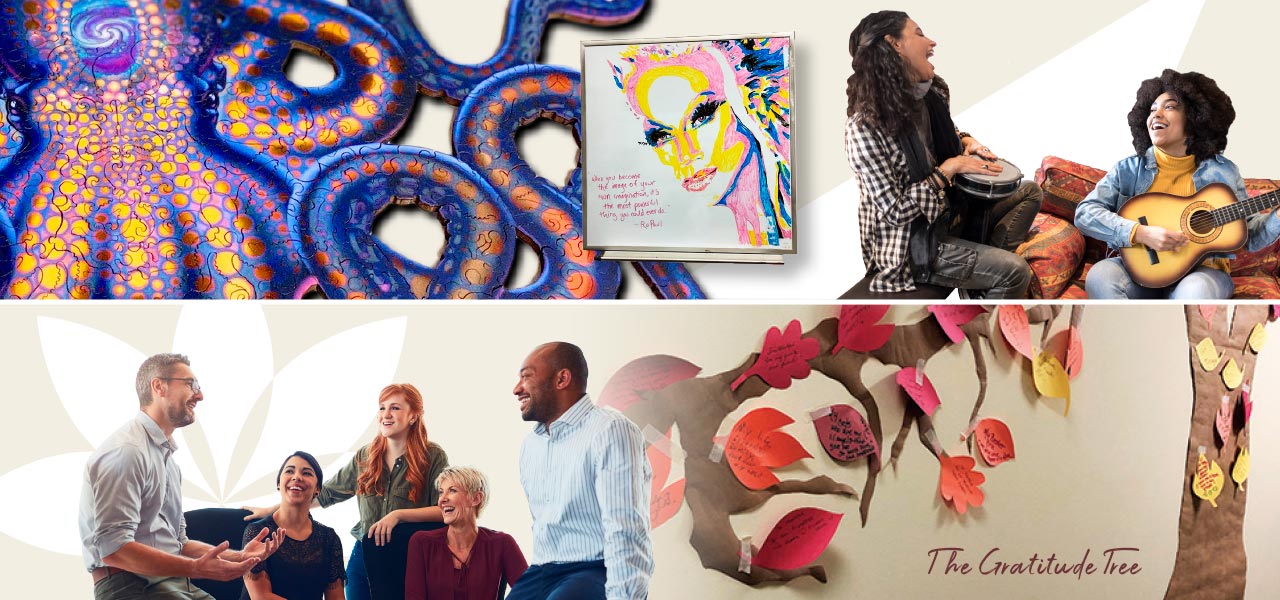Putting the Pieces Together at Eatontown

With a culture that celebrates big and small successes, the Eatontown team nominates fellow staff members weekly for “Star of the Week” recognitions that range from making someone laugh to completing a particularly challenging treatment plan. They also practice team building in another unique way: through puzzling.
Completed collectively as a team, these challenging puzzles are set up in an area accessible to all staff members, who stop by periodically to work on them. The puzzle pieces are uniquely shaped and made of wood, with a scent reminiscent of a forest. The simple act of working on a puzzle provides staff with an opportunity to decompress and practice self-care. Once the team celebrates the completion of a puzzle, it is framed as art for everyone to enjoy.
The Mindfulness Mindset at Hamilton
At the Hamilton site, every therapy group in the Women’s Program starts with a mindfulness exercise—and so do all the staff meetings. Each morning, a different staff member shares a mindfulness exercise of their choice, which might range from a calming meditation to a discussion on the latest books they’ve read.
“We practice what we preach,” says Hazel Jamieson, MSW, LCSW, Senior Primary Therapist at Hamilton. “Starting the day with mindfulness and intention helps us better support our patients while reinforcing a nonjudgmental stance toward ourselves and others. An added benefit is the opportunity to really get to know one another.”
Gratitude Abounds at Moorestown

With gratitude in mind, staff members at Moorestown give back to others in the form of annual events like a Thanksgiving food drive and holiday gift drive. But gratitude also has taken a more prominent, year-long presence in the form of a Gratitude Tree in the main hallway. Patients, visitors, and staff are encouraged to add leaves to the tree to share what they are thankful for or wish for. In December, the leaves were transitioned to snowflakes to recognize the special hopes and challenges of the holiday season.
“We’ve instilled gratitude into our culture to showcase the support we provide for one another and set a wonderful example for our patients,” says Donna M. Kiley, MSW LCSW, Director of Outpatient Services at Moorestown. “Through the Gratitude Tree, one patient summarized why we all come to work each day. The leaf says simply, ‘I am thankful for another chance.’”
Showcasing Healing Arts at North Brunswick
Creative art therapies are an integral component of healing across Princeton House, but the North Brunswick outpatient site has taken a particularly unique spin on this approach. With a nod to reality television, Women Got Talent was developed as a quarterly event that showcases the many creative abilities of staff and patients in the Women’s Program, with therapeutic benefits.
The cohesion of the team shines through in the coordination of the event, which features activities like singing, playing an instrument, displaying artwork, and baking. While talents vary, the purpose is consistent: to have fun, instill confidence, provide a non-threatening way to express what someone may not be able to verbalize, and demonstrate that everyone has a talent to share.
Inspiration Through Art at Princeton Outpatient

It’s well known that art can be powerful, and team members at the Princeton outpatient site have harnessed the strength of that medium to inspire colleagues and patients in unexpected ways. Several staff members—including patient driver Nicholas Tamasi—use whiteboards to create and display beautiful images or sayings, or post signs near printers reminding colleagues to take a mindfulness break. Tamasi also creates beautiful birthday cards for colleagues.
“We talk so much as therapists, yet sometimes an image can instantly uplift your mood without words,” says Amy Hiraldo, MSW, LCSW, Director of Outpatient Services. “We’re all very passionate about helping others, and sharing inspiration through this unique approach goes a long way.”
Team Synergy at Princeton Inpatient
Teamwork is a strong focus at the Princeton inpatient site, where every opinion matters. Each morning, the multidisciplinary team gathers to discuss the plan of care for patients. Sharing insight and expertise in this way enhances patient safety while ensuring that every aspect of care is considered.
“We can be lighthearted with each other, but we also recognize that we’re caring for acutely ill patients with conditions that are often life-threatening,” says Rose Ravelo, LCSW, Director of Social Work Services. “There’s a level of trust and cohesiveness among staff that’s very evident during these morning sessions. Everyone has an important role in caring for our patients, and input from all levels is valued.”
Interested in joining our team?
Visit princetonhouse.org/careers2 to learn more.
Article as seen in the Spring 2020 issue of Princeton House Behavioral Health Today.



